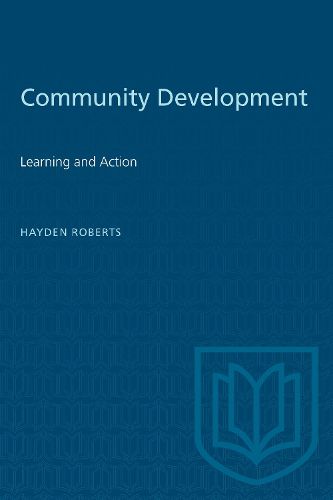Readings Newsletter
Become a Readings Member to make your shopping experience even easier.
Sign in or sign up for free!
You’re not far away from qualifying for FREE standard shipping within Australia
You’ve qualified for FREE standard shipping within Australia
The cart is loading…






Community development is often shaped by purely economic and political considerations, but it can also function as a process of education that expresses the perceptions of people and enhances their control of their society.
Drawing on his experiences of economic models of development in Africa and Canada, Hayden Roberts design a practice theory of development that emerges from, and responds to, the needs of the community itself. His analysis emphasizes the political nature of the process and the central role of adult education in achieving the goals of a given community. His theory, in brief, is that affected people are more capable than outsider of perceiving and assessing the conditions of their lives, and that, with appropriate inspiration and guidance they can plan and act to change these conditions for the better.
Theories of learning, communication, intergroup and interpersonal behaviour, organization, economic development, and political change are all utilized towards the formulation of a comprehensive theory and practical approach to community development planning. Roberts advances a people-oriented approach to development that draws its models from various disciplines and takes into account the local social, economic, and material needs of the community as well as the native abilities of the people concerned. His conclusions are equally relevant to third world societies and to minority groups or sub-cultures in industrialized societies, and they are presented with remarkable clarity and consciousness. He sifts through a maze of theories and emerges with a plausible theory of community development that is backed a every stage by the lessons of practical experience.
The broadly based and humane work will interest all concerned with the process of community development, from planning to action.
$9.00 standard shipping within Australia
FREE standard shipping within Australia for orders over $100.00
Express & International shipping calculated at checkout
Community development is often shaped by purely economic and political considerations, but it can also function as a process of education that expresses the perceptions of people and enhances their control of their society.
Drawing on his experiences of economic models of development in Africa and Canada, Hayden Roberts design a practice theory of development that emerges from, and responds to, the needs of the community itself. His analysis emphasizes the political nature of the process and the central role of adult education in achieving the goals of a given community. His theory, in brief, is that affected people are more capable than outsider of perceiving and assessing the conditions of their lives, and that, with appropriate inspiration and guidance they can plan and act to change these conditions for the better.
Theories of learning, communication, intergroup and interpersonal behaviour, organization, economic development, and political change are all utilized towards the formulation of a comprehensive theory and practical approach to community development planning. Roberts advances a people-oriented approach to development that draws its models from various disciplines and takes into account the local social, economic, and material needs of the community as well as the native abilities of the people concerned. His conclusions are equally relevant to third world societies and to minority groups or sub-cultures in industrialized societies, and they are presented with remarkable clarity and consciousness. He sifts through a maze of theories and emerges with a plausible theory of community development that is backed a every stage by the lessons of practical experience.
The broadly based and humane work will interest all concerned with the process of community development, from planning to action.